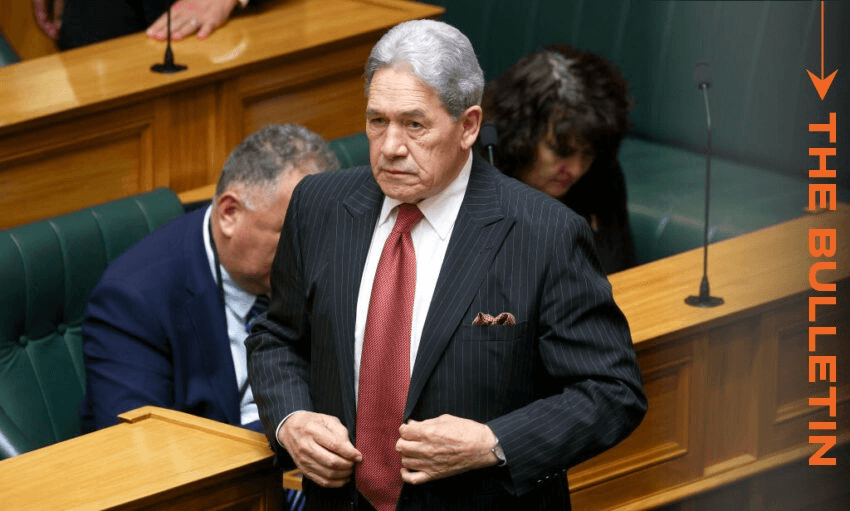Some in the industry say a small number of negligent trainers ‘buggered it’ for everyone else, writes Stewart Sowman-Lund for The Bulletin.
To receive The Bulletin in full each weekday, sign up here.
‘Protecting the welfare of racing dogs’
Let’s return to a topic we talked about way back in June given there has been a significant update from the government. I’m talking about greyhound racing, with Winston Peters confirming yesterday he would take long-awaited action to ban the sport in New Zealand. Investigative reporter Michael Morrah has been covering the issue for years, first for Newshub and now for the NZ Herald. As he reported, the decision by Peters to outlaw greyhound racing followed three critical reviews of the industry along with a number of reported injuries. “This is not a decision that is taken lightly but is ultimately driven by protecting the welfare of racing dogs,” Peters, a known dog lover, told media.
While the ban has been announced, it will take almost two years for it to come into effect in order to let the industry adjust to the change. Urgent legislation was also passed yesterday in parliament to try and prevent racing dogs being killed as a result of the impending ban. Thousands of dogs will need to be rehomed, too. The Herald’s Cherie Howie (paywalled) spoke to a greyhound adopter who said the dogs make great family pets. “They’re not damaged goods. They’re really loving dogs that are gonna need homes.”
A long time coming
We’ll get into the immediate response to the announcement shortly, but first, a little backstory. Peters has been contemplating this ban for sometime given cabinet was considering a move way back in May. It goes back a lot further than that, however. In 2017, a major report revealed more than 2,000 dogs had been injured, and 165 put down, directly due to racing over the previous three seasons. By 2021, the former Labour government had launched the third wide ranging review into the industry in a decade, putting it on notice. No decision was made before the last election despite a subsequent critical report by the Racing Integrity Board. And while Christopher Luxon was on the record during the election campaign as being in favour of a ban, the decision needed to go through Peters who had previously pledged to “clean the industry up” but never expressly spoken in favour of an outright ban. “[Luxon’s] got a minister now who knows more about it than he does, and I’m on the case, alright?“ Peters told reporters in March.
For those wondering whether action could be taken in the future on horse racing, another industry that has its own history of animal welfare concerns, that seems unlikely. Peters declared earlier this year that the industry needs to raise the stakes and get its “mojo” back, reported RNZ’s Felix Walton.
A few bad apples?
The greyhound industry, reported RNZ, said it had a lower rate of euthanasia on race days than the horse racing industry (Peters denied that horse racing was a more dangerous industry, speaking to Morning Report moments ago). “We believe that greyhound racing as an industry has taken huge, huge strides over the last two years and is leading the way in the racing industry from an animal welfare perspective, so the decision today is clearly very disappointing,” said Greyhound Racing New Zealand chief executive Edward Rennell. Peters acknowledged the progress made by the industry, but said it wasn’t enough. A legal challenge was “extremely remote”, reported the NBR (paywalled), meaning the decision announced yesterday seems unlikely to be wound back.
Writing for The Press, Charlie Mitchell looked at how Canterbury’s racing scene appears to have contributed to the sport’s demise, with a pattern of issues linked to the Addington race track including an uptick in injuries to dogs. A leading trainers in the region, Riley Evans, said a small number of negligent trainers had “buggered it for the rest of us”, reported The Post’s Brendon Egan. Another, Matt Roberts, agreed: “It’s devastating, especially when you know 95% of the trainers out here have been doing right by their dogs and there’s been a couple of rotten eggs who have ruined it for everyone”.
But animal welfare advocates said the writing had been on the wall for a long time, and the government made the right decision. “The sport is inherently dangerous… And whilst we appreciate the industry has made some improvements, it has completely lost its social licence,” the SPCA’s chief scientific officer Arnja Dale said, reported Stuff.
All eyes on us
In an opinion piece for the Herald, racing reporter Michael Guerin acknowledged that while the demise of greyhound racing was about the dogs, it was also about the people involved in the industry. “I feel for those greyhound people, some of them kind people who love animals and dogs more than anybody.”
Some will likely move overseas to continue their passion. You may be surprised to learn that New Zealand is currently one of just five nations to still have a greyhound racing industry. The other four are the UK, US, Australia and Ireland. It will be interesting, given those nation’s close ties to New Zealand, whether our decision sets a precedent. The decisions our government has grappled with are not unique. In the UK, reported the Vet Times in October, the government has suggested it could take action to address animal welfare concerns, but a wholesale ban was unlikely. Australia, too, is facing renewed calls to act almost a decade after an investigation exposed the preventable deaths thousands of young dogs a year and triggered a (later reversed) ban, as explained here by the BBC. Whether our government’s actions prompt other countries to take a look remains to be seen, but the rest of the world will be watching.
